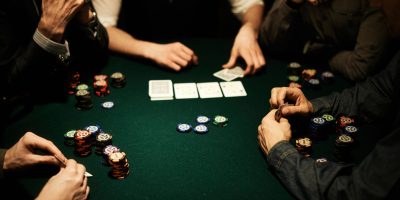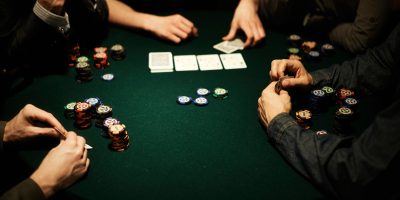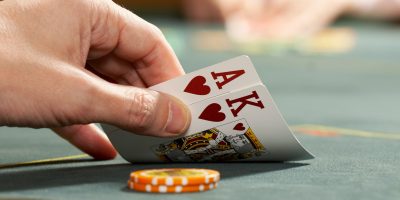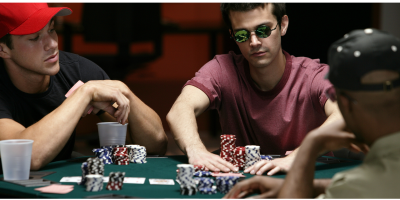Probe Bets in Poker
Our guide to probe bets in poker and how to probe efficiently at a Texas Hold'em table. We detail when to, and when not to, use probing in poker.
In poker, probe bets, or feeler bets, are often used to gather information on your opponent's range and are used to pick up pots when opponents check the flop or the turn. This is often referred to as probing.
(Get your mind out of the gutter - it's not that kind of probing!)
What Is a Probe Bet in Poker
A probe bet is a bet made on either the turn or the river, after the preflop raiser declines to bet the previous street.
For example:
- our opponent raises on the button
- we call in the BB and the flop goes check/check
- if we make a bet here as the BB this is a 'turn probe bet'
- if the preflop raiser bet the flop and checked back the turn then our bet would be a 'river probe bet'
Feeler Bets
These kinds of bets are sometimes called "feeler bets" as some players make them to "find out where they are", and gain information on their opponent's hand/range.
Blocker Bets
If the size is particularly small then they can also be called 'blocker bets' which are designed to make an opponent call a smaller bet than they would have made if checked to, allowing you to see the river for a cheaper price.
Probe Bet Examples
You've probably come across probe bets in the games you play, maybe you've even made them without realizing exactly what they are! Let's look at an example of both a turn probe bet and a river probe bet to see exactly how they work in-game.
Turn Probe Bet
In this example, we're playing a $1/$2 cash game and we're in the BB with . Our opponent raises to $7 on the button and we call. The flop comes , we check, and our opponent checks back. The turn is and we decide to bet $8.
This $8 bet we made is a turn probe bet, as our opponent didn't bet the flop as the preflop aggressor and we bet the subsequent street. This probe bet would also be classed as a semi-bluff as we only had 8 high, but we do have a straight and flush draw.
River Probe bet
In our second example, we're playing the early stages of a tournament and the blinds are 25/50. Our opponent raises from the HJ to 150 chips and we call in the BB with . The flop comes , we check, our opponent bets 150 chips again and we call. The turn is the and both players check. The river is the , we bet 400 chips, and our opponent folds.
The 400 chip bet we made is a river probe bet as our opponent c-bet the flop but didn't c-bet the turn. These bets are sometimes called 'float bets' as they're commonly made after you float the flop with a draw or high card hand and cannot win at showdown - much like the hand in our example.
How Does Probing Work In Poker?
Now we know what probe bets are, let's look at how we should be executing them when we play a sound and winning poker strategy.
Probing Position
You have to be out of position to be able to make a probe bet, if you're in position then the bet you're making isn't a probe bet!
Frequency
The best way to decide the frequency you probe bet is by looking at how your opponents react to them. If your opponents keep folding when you bet, you should be using them often as bluffs and if they keep calling them, then you should be using them often as value bets. However, if you were to look at a solver, they seem to suggest using probe bets at a low frequency.
This is because a solver will have a perfectly balanced checking range and will be able to defend perfectly against a probe bet. Luckily for us, people aren't as good as solvers, and when they check back they are almost certainly going to be unbalanced, with most people generally checking too weak of a range that can be exploited by probe betting frequently.
Probe Bet Size
Probe bets used to always be small bets, but now the game has changed and you should sizing your probe bets the same way you choose all your other bet sizes. Being able to use a multitude of sizings will make you harder to play against, if your opponent knows that if they check back the flop you will only use a small sizing when you bet then, you become easy to plan for and play against.
Board Texture
We will be looking to do more probe betting on boards that are better for our range than our opponent. We do this because we know our opponent will have fewer hands that can defend appropriately against the bet which makes them more profitable for us.
We want to be looking at boards that contain cards that don't frequently appear in our opponent's raising range and appear more in ours. These will be the lower cards (2-8) and if the board contains a lot of these cards it is a good spot to throw out a probe bet as a bluff.
Tournament vs Cash Game
In tournaments, it's more common to see players check back a slightly stronger range than they would in cash games. This is because chips are a finite resource in tournaments and - unlike cash games where you can reload the very next hand. Knowing this, players are more cautious when it comes to value betting so they may check back some hands that would be a value bet in cash games.
What this means for us as the probe bettor, is when we're playing tournaments we need to consider the likelihood that our opponent's checking range is slightly stronger than it may be if it were a cash game, and we should slightly alter our bluffing and value betting ranges accordingly (bluffing slightly less and value betting slightly stronger).
When To Use Probe Bets
It's all well and good knowing how to probe bet, but the most important thing is knowing when to do it.
Keep an eye out for these opportunities to probe bet when you're playing.
When our opponent check folds a lot
Finding opponents that check/fold often is like finding cash lying on the ground - without the guilt you have when you don't hand it in! These players are perfect to probe bet against because you will often win the pot with your small bet and when you do get called, it is only for a small bet.
It's important to keep in mind that if you do get called on the turn, you should be wary of betting the river - it's important to use your hand reading skills to make your river decisions after probe betting on the turn.
When the board is good for our range
Boards that are good for our range will be difficult for our opponent to defend on, which means our bluffs will get through more often. There are some flops, such as , where we will have more 2 pair+ hands in our range than our opponent. On boards such as these, we can apply pressure to our opponent's marginal showdown value hands by betting on both the turn and the river.
Taking some of our weakest hands and probing them on these kinds of boards will make us a lot more money in the long run than if we were to check/fold them.
When we have draws with no showdown value
These hands are great candidates for probe betting as they have equity but will struggle to call a bet from our opponent. By betting them we can win the pot right there on the turn and even if we don't get a fold on the turn, we get to realize our equity and we have the betting lead going into the river so we can decide whether or not to continue our bluff.
When a flop draw completes on the turn
This situation plays into the tendency of people to bet their draws on the flop, so when the in-position player checks behind they will often have very few combos of any draw that completes on the turn. For example, if the flop is and the turn is the , completing the flop straight draw (98), it's a good spot to apply a lot of pressure to your opponent's likely weak range as we would expect them to bet 98 as well as their Tx hands on the flop.
When we have a good value hand
From what we've covered so far you'd be forgiven for thinking that probe bets are only bluffs but this isn't the case, they can also be value bets. When we have good hands it pays to build a pot and if our opponent isn't going to bet the flop and do it for us then we need to start making that pot bigger.
These scenarios are why people have stopped exclusively using small sizings for their probe bets - if we only use small sizings to probe bet then we are losing money with our strongest hands.
When To Avoid Probing
Given all those good reasons to probe bet, you may be tempted to do it every time - but hold on! There are some scenarios where we should be avoiding probe betting as often, like these:
When our opponent checks back a lot of strong hands
If we know our opponent likes to 'trap' by checking back lots of strong hands on the flop then our probe bets are going to become a lot less profitable. We will want to limit the number of bluffs we have to hands that have decent equity when called such as straight draws and flush draws.
We also want to make sure that when we're value betting, we have a stronger hand than we would against other opponents to account for all the strong hands they're checking back. If we start value betting too thin we will be called by better hands far too often which will cost us in the long run.
When we have marginal showdown value hands
In these scenarios, we have hands that could be the best hand but will struggle to get called by worse. For example a hand like or on , it's tempting to want to be these hands to 'find out where you're at' but the reality is that when we're called we're usually only getting called by better hands and when our opponent folds it's going to be a worse hand than the one we had.
In these scenarios, we'd be better off checking and playing our hand as a bluff-catcher on turns and rivers.
When the turn is good for your opponent's range
These are scenarios generally going to be when the flop is low and a high card comes on the turn. For example, if we see a flop of and both players check, an ace or a king on the turn is going to hit our opponent's checking range pretty hard. So in these situations, we want to do less bluffing than we would if the turn was another low card.
This can also apply to turns that pair the bottom card, such as , . On this flop, it's reasonable to assume that our opponent will often check back with most if not all of their Kx and 8x hands and possibly some of their Ax hands. We also know it's a good flop for our opponent so we can expect them to c-bet a lot of their 'air' hands which makes their checking range even stronger. Again, in these situations, we want to severely limit the amount we probe bet because of how often we expect to get called by our opponent.
Poker Probe Bets - FAQ
We have collected some of the most common questions surrounding probe betting and answered them below:
What is the size of a poker probe bet?
A probe bet can be any size. The size doesn't matter, the thing that makes it a probe bet is the action that goes before it. If it is a particularly small bet then it can sometimes be called a blocker bet but either way it is still a probe bet.
How to spot a probe bet in poker?
A probe bet is a bet made from the out of position player on either the turn or the river after the preflop aggressor declines to bet either the flop (turn probe bet) or the turn (river probe bet).
What does probing mean in poker?
'Probing' in poker is a bet made by the out of position player after the preflop aggressor checks back the flop or the turn. It's typically a small bet and is used to try and gather information about their opponent's range.
Should you use a probe bet after a missed continuation bet?
There are several situations where you should use a probe bet after a missed c-bet:
- If your opponent has a high propensity to fold after checking.
- If you have a draw that can't call a bet if you check.
- If the board is much better for your range than it is for your opponent's range.
- If you have a value hand that wants to start building the pot.
Are probe bets profitable in the long run?
Yes! Many players overfold the turn after checking back the flop, especially at lower stakes so making probe bets on the turn will be profitable. River probe bets will also be profitable if you find players who give up a lot after c-betting the flop.
Can you probe bet on the flop?
No, a probe bet can only come on either the turn or the river. Betting into the preflop aggressor on the flop is called a 'lead' or a 'donk' bet and is a different action altogether.
What are the differences between a probe bet and a c-bet?
A c-bet is made by the preflop aggressor on either the flop, turn, or river whereas a probe bet cannot be made by the preflop aggressor and can only be made on the turn or river.
Being able to take advantage of weakness in poker will lead to greatly increased profits, if you can properly incorporate probe bets into your game then you have gained a tool with which you can steal pots when your opponents show weakness.





